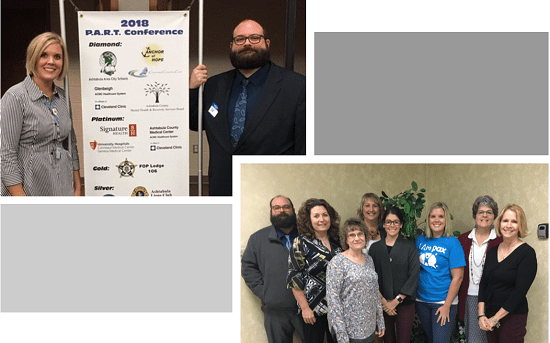
“Ashtabula County is the northeastern most county in the state of Ohio and the largest county in Ohio by area, encompassing 702 square miles,” said the coalition’s coordinator Kaitie Park. “It is a federally designated Appalachian Region and is struggling with many of the same economic and educational deficits found in other Appalachian regions of the state. The county has two qualified opportunity zones, one in Ashtabula City and one in Conneaut. According to population estimates by the U.S. Census Bureau, the 2018 population estimate is 97,483. Median household income for 2013-2017 was $43,017. 19.3% of persons of all ages were living in poverty, compared to 13.9% for Ohio, and 28.4% of youth under the age of 18 were living in poverty, compared to 19.8% for Ohio. The 2019 Ashtabula County Community Health Assessment revealed that 10% of county adults were without health care coverage and reported they could not afford to pay the insurance premiums.”
“In response to a local opiate-related tragedy, 170 citizens and stakeholders attended the coalition’s first county-wide Opiate Summit in October 2011,” said Park, “positioning Ashtabula County Prevention Coalition (ACPC) as a viable coalition focused on youth substance misuse prevention. Supported by its partner, the Ashtabula County Mental Health and Recovery Services Board (a 2014 DFC grantee), ACPC’s strong volunteer corps and diverse membership are led by a 12-sector Leadership Board. Two staff and six committees manage its action plan.”
“The overall culture of the county is diverse,” said Park. “46.4% of the county is rural and the remainder can be described as micro-urban, having the same issues as large urban areas without the advantages of resources available to those areas. The unique issues faced by coalition include the large geography of the county and its various cultures. The Prevention Coalition is working to address the social determinants of health and connect all residents to resources by reaching out to traditional and non-traditional partners to build community resilience.”
Coalition Coordinator Kaitie Park was hired in 2014 with funding provided by a Drug Free Communities Grant. During her tenure, Kaitie has worked diligently to build relationships with Ashtabula County’s seven public school districts. Throughout 2018, in an effort to prevent circumstances contributing to the Opiate Epidemic, the Ohio Department of Mental Health and Addiction Services (MHRS) launched a large-scale initiative of the PAX Good Behavior Game in Ohio schools. “This intervention teaches self-regulation in young people with dramatic effects on behavior, academics, and even long-term outcomes such as preventing mental health and addiction disorders,” said Park. “We utilized the coalition process to engage the MHRS Board, all Ashtabula County schools, and all coalition partners in supporting the implementation of the PAX Good Behavior Game in the schools. This evidence-based practice is also being implemented in five local Head Start pre-school programs. The collaborative efforts of the coalition afforded an opportunity to train 453 teachers thus far in the implementation of the PAX Good Behavior Game in seven school districts. In addition, Prevention Specialist Katie Morrison and I became PAX Tools Facilitators, which has enabled us to enhance the skills of community members and persons who interact with youth,” said Park. “On average, the schools that are being monitored by the coalition saw a 52% decrease of unwanted behaviors in the classroom during the first year of implementation.”
“Look for opportunities to build youth resiliency and increase protective factors in order to address some of the root causes of substance misuse,” said Park. “Be open to partnering with every community organization that you can to create community ownership and momentum. A key to our coalition’s progress in implementing evidence-based prevention programming throughout Ashtabula County has been building strong connections through consistent and reliable relationships with community partners such as local schools, hospitals, law enforcement, treatment providers, and government agencies. Building these relationships takes time, energy and isn’t often something that happens immediately. Building these connections is critical to the success the Ashtabula County Prevention Coalition has had in increasing our county-wide prevention efforts.”


